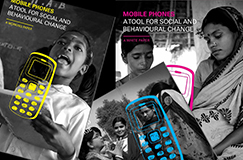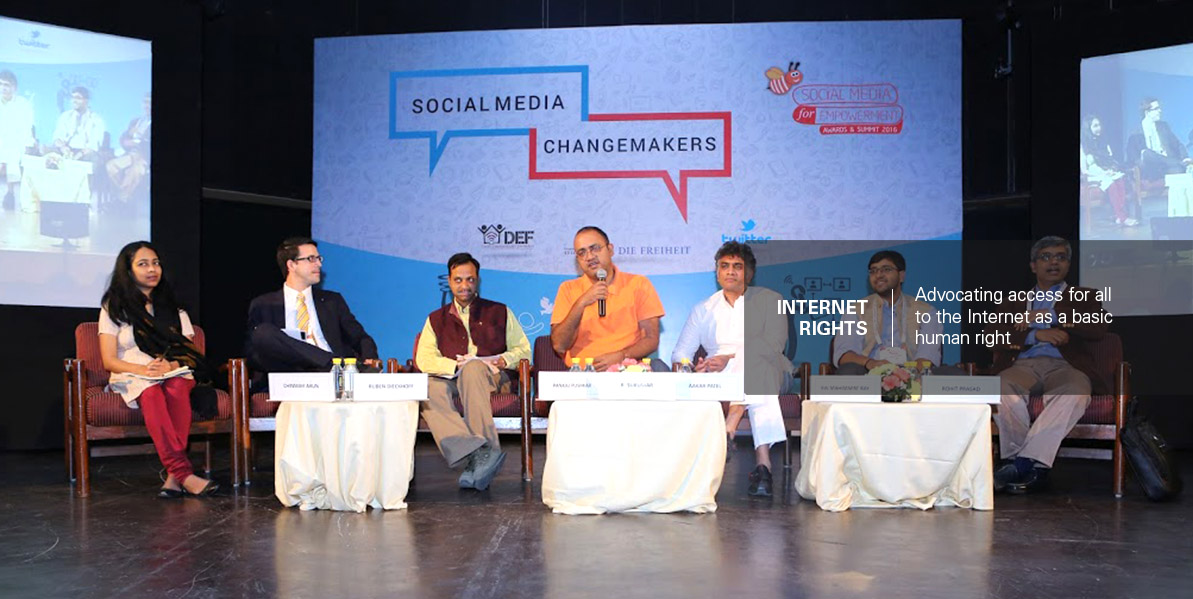Internet RightsRed Rickshaw RevolutionMobile for Social & Behavioural Change Networking for freedom online and offline: protecting freedom of information, expression and association on the internet in India In November 2011, Digital Empowerment Foundation (DEF) and the Association for Progressive Communication jointly submitted their first Universal Periodic Review (UPR) focusing on Internet rights and making the Internet an effective tool to access right to information in India. As an outcome, DEF initiated the Internet Rights project in December 2011 to advocate “Internet access for all” at the national level. The project aims to address the specific areas of concern such as right to information, Internet & information access, Internet governance, Internet regulation, content specifications, cyber law, and appropriate policy frameworks. The project brings out critical aspects of the Internet with relation to human rights, right to information and how the Internet has been utilised by different sector of societies, marginal and underdeveloped communities to address their issues. The Internet Rights programme has evolved since then, with the addition of the APC-IMPACT project. IMPACT stands for “Networking for freedom online and offline: protecting freedom of information, expression and association on the Internet in India, Malaysia and Pakistan.” There are five key objectives to the Internet Rights programme which are in close correlation to those of the IMPACT project.
- Build awareness among target groups of the critical importance of protecting and promoting human rights on the Internet as a pre-condition for democracy and the exercise of civil and political rights.
- Strengthen understanding among target groups of how restrictions of human rights on the Internet are implemented (including the rights to freedom of expression, privacy, and freedom of assembly), how these rights are being threatened at technical and regulatory levels by both States and corporations, and what techniques they can use to communicate more securely and safely online.
- Provide human rights defenders (our primary target groups) with knowledge, tools and support to respond to rights violations and advocate for the long term protection of human rights on the internet.
- Facilitate and support multi-stakeholder networks that can respond to threats to human rights on the internet and build stronger human rights cultures on the internet in each of the three countries.
- Facilitate strategic linkages between national, regional and global advocacy for human rights on the internet through making use of opportunities presented by the Internet Governance Forum and the UN’s Human Rights Council, among others.
With these objectives in mind, Internet Rights focuses on advocating for Internet as a basic human right; accelerating Internet as a medium to exercise the right to freedom and expression; freedom of association and freedom of assembly; improve the recognition of human rights on the Internet; improve understandings, skills and strategies among HRDs and CSOs of how restriction on freedom of expression, freedom of assembly, freedom of association on the internet operate; and improving skills among local rights groups to advocate. In the last couple of years, DEF’s Internet Rights project has contextualised Frank La Rue framework with respect to the Indian Constitution and legal framework; published the country research report ‘Limited access restricting expression’; organised five capacity building workshops on strengthening human rights organisations on online aspects of freedom of expression, freedom of association and freedom of assembly; and advocated online FoE; FoAA in national and international consultations/workshop. Website: www.internetrights.in
Research & Advocacy
We understand that DEF can only achieve its goals with the full support of all stakeholders, including the government, industry, civil society organisations and ordinary citizens. This requires advocacy campaigns; and advocacy in turn requires research and knowledge support. Projects in this programmatic area, therefore, address the twin needs of advocacy and research.
Contact Details
Celebrating the achievements of ordinary women doing extraordinary work from various walks of life
Red Rickshaw Revolution, a Vodafone Foundation’s initiative, was first started in 2013 as an auto rickshaw journey from Delhi to Mumbai to celebrate the achievements of 50 inspirational women and raise funds for three NGOs working towards women empowerment.
The 2014 journey started on November 28, 2014, with the objective of covering nine states — Maharashtra, Madhya Pradesh, Rajasthan, Gujarat, Chhattisgarh, Jharkhand, Odisha, and West Bengal — and unveiling another 20 extraordinary women. Nine states were selected for this journey. This journey featured 20 elected women leaders in the panchayat,
The stories of women achievers found during this journey have been compiled into a book titled Red Rickshaw Revolution. The project now stands completed as of December 31, 2016.
Additionally, the Revolution also led to the inauguration of 20 dCIRCs (digital Community Information Resource Centres) in partnership with Vodafone Foundation. These centres have registered community members under Intel Easy Steps programme but at the same time Google video learning tools were also used hand-in-hand as audio-video theory classes.
Website: www.redrickshawrevolution.in
Research & Advocacy
We understand that DEF can only achieve its goals with the full support of all stakeholders, including the government, industry, civil society organisations and ordinary citizens. This requires advocacy campaigns; and advocacy in turn requires research and knowledge support. Projects in this programmatic area, therefore, address the twin needs of advocacy and research.
Contact Details
Exploring mobile-based projects and how they have impacted women, girls and It is quite evident that “mobile” inherent characteristics such as voice and peer-to-peer SMS bring better development outcomes. Understanding the essence of mobiles as a communication tool, UNICEF India and DEF in 2013 initiated a project called Mobiles for Social and Behaviour Change to explore various projects where women, adolescent girls and youth have effectively used mobiles in areas of health, education, sanitation, environment and monitoring and training of frontline workers. The project aims to understand how mobile phones have been used by communities in their daily lives for various purposes. The first phase of the project was launched in 2013 with a two-day consultation on ‘Mobile Phone as a Tool for Social & Behaviour Change’ in New Delhi. Twelve initiatives were invited for the consultation to explore the concept of ‘Mobile as a Communication Tool for Development’. The recommendation of the first phase was to conduct deeper research to understand these projects and create more concrete partnerships between project stakeholders and the state government so that each state could adopt and implement MSBC project at higher scale. On the basis of this recommendation, UNICEF India and DEF extended their partnership for MSBC Phase II in 2014. This meant going a step further into the issues around MSBC and creating a formidable platform to provide knowledge on diverse MSBC implemented projects. Besides conducting deeper research on MSBC projects on their usage of mobiles for social and behavioural change (SBC) in India, both for referential value and for advocacy purpose, DEF organises state-level consultations to allow state governments to forge partnership with local MSBC projects to scale up at wider level and develops a directory of MSBC projects — beyond their participation at the five state consultations — that can be used for referential purpose and advocacy.
The objective of the project is to:
- Strengthen capacity of state-level departments (primarily health, education, water and sanitation, and rural development) on how mobile phones can be used as a communication tool
- Strengthen capacity of frontline workers on how mobile phones can be used as a communication tool for disseminating information; monitoring & tracking of their stakeholders; interpersonal communication
- Create an action based research on “Mobile Phone: A Public Tool” that can be used by policy makers, government, CSOs and other stakeholders for advocacy and referential
- Attempt of scaling up of such practices to existing and new locations in order to reach out to the participant groups
So far, under the MSBC project, DEF has organised one national and five state-level multi-stakeholder consultations in Madhya Pradesh, Uttar Pradesh, Andhra Pradesh, Tamil Nadu and Assam. It has also published a research analytical report titled ‘Mobile Phone: A Public Tool (Analysing the use of mobile technology in civic participation, education & health)’ and a compendium titled ‘Mobile Phones for Social & Behaviour Change: A compendium of 100+ initiatives in India)’ Website : www.msbcindia.org
Research & Advocacy
We understand that DEF can only achieve its goals with the full support of all stakeholders, including the government, industry, civil society organisations and ordinary citizens. This requires advocacy campaigns; and advocacy in turn requires research and knowledge support. Projects in this programmatic area, therefore, address the twin needs of advocacy and research.






